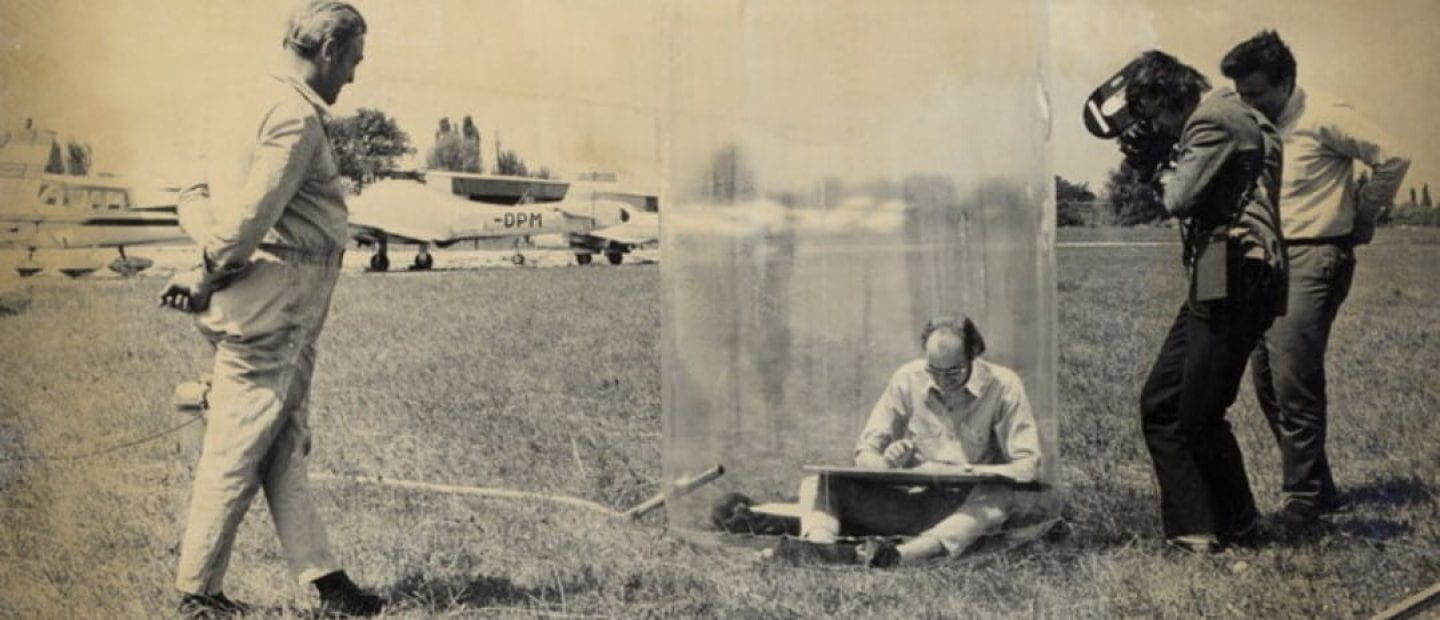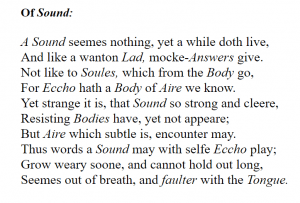“News Piece (ongoing),” Holly Pester

The Right Honourable Lord Justice Leveson. <https://www.newstatesman.com/media/media/2012/05/leveson-second-half-inquiry-may-not-go-ahead>
Holly Pester’s “News Piece (ongoing)” is a difficult poem to talk about, mostly because there is so little talking in it. Nevertheless, I also think that there is an obviousness to its scene of representation that bears teasing out, an obviousness that compels articulation in dilatory exegesis. The “huurp>>” and “hup>” that punctuates the space between the words plucked from news reports create the piece’s hyperventilating prosody. Listening to or reading “News Piece” aloud generates a cyanotic anxiety that becomes all consuming as the items progress and Pester (or I) fight harder to exhale on the substantive content of each news entry. Pester has elsewhere suggested that she feels the monotone poet-voice that we are mostly familiar with is politically and aesthetically dubious, writing in “The Politics of Delivery (Against Poet-Voice)” that:
I have a fully felt and fraught relationship with delivery. I care about delivery compositionally; I enjoy the affects of composition working on and into my voice. Sometimes it feels as if my voice is the victim of some impossible contract with the text. The effort and timbres of delivery are therefore potentially very significant to a political poet… It is part of the craft of poetry that isn’t unrelated to the intrinsic vocal identity of the poet (accent etc), yet has as much to do with tensions within the communities, heritages and civics of poetry as with the individual.
“News Piece (ongoing)” deeply registers this “fully felt and fraught relationship” and imbricates it into the scene of its prosody. In this poem, I’d like to suggest, the “individual” as such is figured exclusively through the imposition of bodily rhythms, that is the prosody implied in the movement in and out of breath dictated by the poet’s directions, into the semi-regular cadence of the news cycle, the news bulletin. Just as in Guy Debord’s 8th aphorism in Society of the Spectacle “Lived reality is materially invaded by the contemplation of the spectacle while simultaneously absorbing the spectacular order, giving it positive cohesiveness” (3), that is, the spectacle is the mediating master code of social relation dominated by reification as such, Pester’s poem invades the spectacular news cycle with the lived reality of breath, reversing Debord’s figuration and challenging the scopophilia of the news cycle. This occurs literally throughout the poem.
This entry, dated “Wednesday 20th July 2011,” takes as its lead headline (along with the probable order of stories on the day) the News International phone hacking scandal that was a continuously unfolding story for much of that time – the reckoning of tabloid tactics of police bribery, exercising improper influence and other activities resulting in the closure of News of the World and the judicial public Leveson Inquiry announced 2 weeks prior that went on to bring witnesses such as Hugh Grant, J. K. Rowling, Sienna Miller and the parents of Madeleine McCann, and later figures like Jude Law during a trial at London’s Old Bailey. After the first heavy intake of breath, we are allowed to breathe out on “hacking.” The voiceless glottal fricative or aspirate of the ‘h’ compels this exhale in order to make the sound without recourse to vocal chords, explicitly articulating the onomatopoeic quality of the ‘hack,’ not in the sense of gaining unauthorized access, but in the physical sensation of the dry, hacking cough which produces its sound through pulmonic exhalation and the contraction of the glottis – like comic Cathy’s chagrinned “Ack!” transfigured into sickness. One’s body ‘hacks’ to follow Pester’s instruction to “Exhale on none arrowed type while speaking as word.” Breathing is not just syntactically and semantically inserted into the lexicon of the news bulletin (that is, as a stand in for the words between the phonetic stresses of Pester’s abbreviations), but becomes contiguous with a scene of bodiliness that produces sound and the expression of ‘news.’ It is in this way that Pester deeply registers the Olsonian equation in Projective Verse that “verse will only do in which a poet manages to register both the acquisitions of his ear and the pressures of his breath,” but displaces the syllable as “king” and replaces it with the contraction of the glottis and the push out from the diaphragm as the “king and pin of versification” (241): in which the prosody and meaning are produced simultaneously in the alveoli and as such in the material of the body. Just as “it is from the union of the mind and the ear that the syllable is born” (242), it is from the lung that Pester’s formulation pushes out to create its argumentation. So, when, as before, “the effort and timbres of delivery are therefore potentially very significant to a political poet” we can get closer to what she means.
Elsewhere, considering the hunched poet over the keyboard at the moment of writing in her short piece The Body and the Page in Poetry Readings as Remembrance of Composition, Pester writes that “the cricked-of-neck poet, delivering their poem as if for the first time each time from the page, nodding along to every printed unit, is behaving in a way mechanically analogous to the moment of composition” (271). Recalling this moment of composition (the production of semantic language), Adriana Cavarero in For More than One Voice suggests that “rooted as it is in the organs of respiration and phonation, speech in fact alludes to the vicissitudes of the body where the humors of the passions boil… before the advent of metaphysics, it was more natural to believe that thought was a product of the lungs” (62). Holly Pester’s particular continuous project translating the spectacle of the news cycle to the expression of the body is her specific intervention into the incorporeal reification of the spectacle described by Debord. If the moment of composition is recalled by the hunched reader, Pester recalls such a moment of thought figured as bodily knowledge that is used to impinge upon the autonomous authority of the news cycle that produces the reified commodity of the spectacle. It is in this way that “News Piece (ongoing)” “has as much to do with tensions within the communities, heritages and civics of poetry as with the individual,” not only registered separately, but contiguous with each other in a semantic dialectic of in and out or myself and yourself without that object in between. When repeating “Afghan,” Holly Pester ceases to reference the bulletin and draws attention to the lived reality of that subject through her incoming cyanosis. Breathe in and out. Try not to hyperventilate.
James Garwood-Cole
Works Cited:
Cavarero, Adriana, For More than One Voice: Toward a Philosophy of Vocal Expression, trans. by Paul A. Kottman (Stanford, CA: Stanford UP, 2005)
Debord, Guy, Society of the Spectacle (Detroit, MI: Black and Red, 1977)
Olson, Charles, “Projective Verse,” in Collected Prose, ed. by Donald Allen and Benjamin Friedlander (Berkeley and Los Angeles, CA: University of California Press, 1997), pp. 239-249.
Pester, Holly, “The Body and the Page in Poetry Readings as Remembrance of Composition,” in Memory in the Twenty-First Century: New Critical Perspectives from the Arts, Humanities, and Sciences, ed. by Sebastian Groes (London, UK: Palgrave Macmillan, 2016), pp. 271-275
__________, “News Piece (ongoing),” Jacket2 (2012), <http://jacket2.org/poems/poems-holly-pester> [accessed 25 Nov. 2020]
__________, “The Politics of Delivery (Against Poet-Voice),” The Poetry Review, 109:2 (Summer, 2019), <https://poetrysociety.org.uk/the-politics-of-delivery-against-poet-voice/> [accessed 25 Nov. 2020]



Leave a Reply
You must be logged in to post a comment.